Stay in the know on all smart updates of your favorite topics.
2019 Delegations Report: Sharing Experiences and Fostering Collaboration
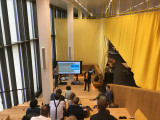
In 2019, Amsterdam Smart City coordinated and hosted 114 delegation visits. Most delegations visit to gather knowledge, learn from best practices, meet innovative companies and startups, and to establish new collaboration opportunities.
As in previous years, South Korea visited most often, with a total of 27 groups. Other delegations visited from Japan (11), Germany (8), United States (5), Denmark (6), the Netherlands (5), Finland (4), China (4), Turkey (3), Singapore (3), Sweden (3), Russia (3), Bangladesh (2), France (2), India (2), Malaysia (2) and Taiwan (2).
Groups by type:
• Public: 51
• Academic / research: 28
• Private: 21
• Public-private: 11
• Media: 3
Most visited projects:
• De Ceuvel Living lab
• Marineterrein Living Lab
• Johan Cruijff Innovation Arena
• Schoonschip
In a previous post we shared the experiences from visits in the first half of 2019. In this post we look at a cross section of delegations that visited Amsterdam Smart City during the second half of 2019.
1. Finish Association of Local and Regional Municipalities
Twenty-three mayors and elected officials from smaller Finish municipalities visited Amsterdam with interest an in sustainability projects involving citizens. Besides getting an introduction to Amsterdam Smart City, the group visited Pakhuis de Zwijger for a presentation and discussion with Servaz van Berkum. The project which stood out the most for this group was the Frans Halsbuurt redesign where 600 on-street parking spaces have been removed, providing residents with a unique opportunity to co-create the new public space. The delegates were impressed with the role of Pakhuis de Zwijger as a neutral facilitator of the co-design process and that the outcome is binding for the municipality. The delegates expressed that experimentation with citizens’ participation and co-creation is a key priority for Finish municipalities. It is also an area they would like to continue learning and exchanging experiences about.
2. City of Helsingborg, Sweden
This delegation of 12 city directors from Helsinborg municipality was interested in two main topics: 1. The “Amsterdam Approach”, or the reason why Amsterdam won the Innovation Capital award in 2016 and 2. Amsterdam’s experience and best practices on place-making topics. The delegation met with Amsterdam Smart City Program Director Leonie van den Beuken for a discussion about public-private collaboration and bottom-up innovation in Amsterdam. The group also met Stefan Bodecker from Placemaking Plus who shared a broad range of place-making projects and interventions in Amsterdam and the metropolitan area, especially in disadvantaged communities. Stefan’s message which resonated most with the group was that “place-making is a powerful tool to transform communities and you should focus where the problems are the biggest”. The program finished with a tour of Marineterrein Amsterdam Living Lab, Oosterdokeiland, and Central Station.
3. Singaporean Smart Mobility Delegation
A delegation of 18 public-private representatives from Singapore visited Amsterdam Smart City as part of a mission visiting the Intelligent Transport (ITS) Congress in Eindhoven. The group was most interested the possibility for Singaporean startups testing their solutions in Amsterdam. The group expressed interest in further exploring potential channels for collaboration and co-innovation between Dutch and Singaporean ecosystems on smart mobility, especially on autonomous vehicles (AV’s) and MaaS.
4. Association of Flemish Municipalities (VVSG), Belgium
A group of approximately 40 elected officials from Flemish cities and municipalities visited Amsterdam with a focus on smart, sustainable and circular cities. The full day study program started with introductory presentations to Amsterdam Smart City and the City of Amsterdam Chief Technology Office, followed by an innovation tour of Johan Cruijff ArenA. In the afternoon the group split up into two tracks. One group visited De Ceuvel, Schoonschip and Buiksloterham in Amsterdam North with a focus on circular area development, led by Frank Alsema of Urban Labs and Geert Litjens of Spectral Energy. The second group visited Epicenter digital innovation hub with a focus on data-driven innovations and smart mobility. This group met with Carlien Roodink from Axians, Christine Groothuis and Jeroen Brink from Municipality of Haarlemmermeer and Joey Fontaine from EV-Box.
5. Ecologic
As part of the Energy Future Exchange (EFEX) program, Ecologic Institute visited Amsterdam Smart City with a group of 13 public-private international professionals in the energy sector. The group was interested in the way public, private and civil society stakeholders work together on sustainability projects. These delegates were impressed with the rich ecosystem of projects and pilots, judging by the engagement and activity on the Amsterdam Smart City platform. They confessed there is often an appetite to start similar initiatives in their home cities but leadership is often lacking.
6. Southern Company
Michael Britt, VP Energy Innovation Center at Southern Company visited Amsterdam to connect to key innovations related to smart energy and smart grids. Amsterdam Smart City facilitated a visit to Quby with a focus on smart home / energy devices, as well as a meeting with Alliander Strategy Director, Pallas Agterberg to discuss the role of Alliander in the Amsterdam Smart City program as well as with the broader energy transition. Reflecting on the program, Britt praised the way public and private, large and small parties work together in Amsterdam and wanted to bring a similar approach to Atlanta and other places where Southern Company operates.
7. Korea Electronics Technology Institute (KETI) and Gwangju City
This delegation of 12 researchers and governmental representatives was interested in innovations related to data-driven and citizen-led air quality projects. After being introduced to bottom-up projects such as Hollandse Luchten and ClairCity, the delegation dove deeper into the discussion of how big data can help improve decision making on air quality topics with Martin Smit from Caeli.
8. Trianel Cooperation, Germany
A delegation of 14 city and utility managers from small and medium-sized German municipalities visited Amsterdam with an interest in innovative technologies and business models. The group started out the program with an introduction to smart energy developments in Amsterdam and the Netherlands by Adriaan van Eck from Flexiblepower Alliance Network. The group also discussed the governance and evaluation of smart city projects with Marije Poel from the Smart City Academy at the Amsterdam University of Applied Sciences and dove into technical discussions and demos with Hubert Penn from Dexter Energy and Geert Litjens from Spectral Energy. Participants communicated that a key challenge for German municipalities and utilities is a lack of mandate or responsibility to facilitate public-private collaboration. While there is a desire to work together, it is not anyone’s responsibility to initiate action. In this sense, participants were impressed with the role of Amsterdam Smart City as a facilitator and its continuity over the past decade. The group wrapped up their program with a meeting and tour of the Johan Cruijff Innovation Arena, hosted by Huib Passman.
9. Nikken Sekkei Research Institute (NSRI) & Fudson, Japan
Amsterdam Smart City hosted NSRI & Japanese real estate developer Mitsui Fudosan for a program focused on organization and governance of smart city programs and projects. The delegation was interested in the role of Amsterdam Smart City in smart city projects, and lessons learned which could be transferred to Kashiwanoba smart city project in Japan. The program focused primarily on the evolution of Amsterdam Smart City from a European-funded project with focus on implementing smart energy / smart grid projects, to an ecosystem facilitator. The delegates were most impressed with the transparency of the community platform and thought this could be a way to facilitate closer interaction between professionals and citizens, which is a key priority in the development of Kashiwanoba.
10. City of Reykjavik, Digital Transformation Team, Iceland
Once the City of Reykjavik had set out to develop a smart city data platform and warehouse, their Digital Transformation team visited Amsterdam to learn from its experience on similar topics. A roundtable discussion was hosted at City of Amsterdam’s Data Lab with contributions by Tamas Erkelens from the Chief Technology Office and Hein Wils from Information & Statistics Department. The discussion focused on Amsterdam’s experience and lessons learned from setting up DataPunt – the smart city data infrastructure which makes data about the city findable and accessible for further processing by employees of the municipality as well as the general public. The meeting was followed by the international edition of the Data Dilemmas event where representatives from Reykjavik and Boston shared data-driven projects and related ethical dilemmas along with Amsterdam and Hilversum.
Priorities for 2020
Improved Exchange
Over the past three years, Amsterdam Smart City has shared experiences and inspiration with more than 250 delegations and 3250 participants. To increase our impact in 2020, Amsterdam Smart City will focus on improving the quality of the exchange and learning between visiting delegations and local stakeholders.
To achieve this we will prioritize delegations that would like to share projects and lessons learned on key topics of interest to Amsterdam Smart City partners and stakeholders:
• Data-driven innovations contributing to clean energy, circular economy, and emission-free mobility
• Use cases and standards for 5G, IoT, digital twins and data platforms
• Data management and cyber-security for responsible digital cities
• Collaborative innovation methodologies: best practices for facilitating innovation between public-private stakeholders
Testing & Piloting as a Tool for Exchange
As a partner of the Marineterrein Amsterdam Living Lab, Amsterdam Smart City facilitates testing of innovative technologies and approaches to urban challenges. A key priority for 2020 is to facilitate national and international stakeholders wishing to test and validate their innovative solutions on the Marineterein Amsterdam Living Lab.
Opportunities for the Amsterdam Smart City Community
Another key priority for 2020 is to further support Amsterdam Smart City partners in the broader ecosystem with sharing knowledge and best practices with international delegations. Are you active in hosting intentional delegations for knowledge sharing programs by means of lectures, workshops or otherwise? Share your program offer on the Visits page.
Opportunities for Visiting Delegations
Amsterdam Smart City welcomes visit requests year-round. To better facilitate exchange of knowledge and experience, we have designed three key opportunities when visiting delegations can share their best practices with our partners and community:
• June 15-17: WeMakeThe.City festival in Amsterdam
• October 29: Data Dilemmas Event in Amsterdam
• November 15-19: World Smart City Expo in Barcelona
Questions, comments or suggestions?
Reach out to cornelia@amsterdamsmartcity.com
The five cornerstones of effective governance to drive urban innovation.
For urban innovation and digitalisation efforts to succeed, a municipality needs to think through its internal organisation and governance structures. Few ingredients more sharply define the difference between success and failure than having the right governance structures in place.
We asked member city leaders from the Cities Today Institute to share their organisational structure and governance choices. What does their mandate look like? How do they operate across silos? And what to do with the traditional IT manager?
Cyber attacks: it is not a matter of if but when, says New Orleans’ CIO
Las Vegas was hit by a cyber attack on 7 January which followed an earlier attack in New Orleans, with the city declaring a state of emergency on 13 December. The threat of cyber attacks is growing as cities digitalise their services and use datasets to provide more efficient delivery to citizens.
2020 the year (and decade) to Start Smart
We created a few weeks ago the platform StartSmart.city.
StartSmart.city is a special incubation/acceleration program specifically designed to support and invest in cities and startups that develop projects directly or indirectly related to smart cities to strengthen the social and economic fabric of the territory.
StartSmart.city was created with the goal of supporting and contributing to the progress of cities by attracting and retaining talent and entrepreneurs by providing different and alternative channels for access to investment and financing.
I hope you can reach us in 2020!
Let’s go together to a different dimension of smartness.🚀
Bring it on 2020! 🏄
Rijkswaterstaat: Climate-neutral and Circular Procurement
The Netherlands has high policy ambitions to become 100% circular by 2050, and consume 50% less primary raw materials in 2030. Public procurement can be an incredibly powerful tool, and the Dutch government sees climate-neutral and circular procurement as a means to achieve significant CO2 reductions. However, a framework to quickly and easily assess what is green, circular and climate-neutral can be challenging.
Metabolic proposed a framework for impact measurement of Green Public Procurement, did an analysis of the current state of impact measurement and developed a roadmap towards a harmonized model for the public sector in the Netherlands. We approached the study on three different levels: the level of a product group, the level of an organization and the level of national reporting. Subsequently, we developed a roadmap with actions that should be taken in the coming 5 years in order to arrive at a more uniform impact monitoring for climate-neutral and circular procurement.
Implementation of the roadmap produced in the study will help the Dutch government develop a clear monitoring framework that helps public organizations compare purchase options and make sustainable purchasing decisions more easily.
Gezocht: Internship digital security bij Free Press Unlimited
Free Press Unlimited is offering a five to six month internship (32 hours a week) starting in January 2020. We're looking for a tech-savvy student or recent graduate with a relevant educational background and affinity with media development.
You will support several media projects implemented together with international partners. You will join the Gender, Safety & Accountability team in realising projects with global coverage in the field of digital safety and investigative journalism.
Are you drawn to whistleblowing platforms for media, online digital security courses for journalists? Do you feel confident about your knowledge of encryption, privacy, open source software and safe communication options? Then this internship is for you!
Op weg naar een flexibel, robuust en betaalbaar energiesysteem
In mei van dit jaar trad Ingrid Thijssen, CEO van Alliander, toe tot de Board. Als één van de grootste energienetwerkbedrijven van Nederland, voelt Alliander een grote maatschappelijke verantwoordelijkheid. Daaraan geeft het bedrijf onder meer invulling door actief bij te dragen aan de ambities van de Board. “Door slim samen te werken, vooruit te kijken en slim gebruik te maken van de openbare ruimte, maken we de regio samen klaar voor de toekomst.”
Doughnut cities
This is the title of the newest edition in my series 'Looking for the humane city'. The well-known Kate Raworth plays an important role, but I refer to other approaches too.
Wie het artikel liever in het Nederlands leest han hier terecht: https://wp.me/p32hqY-1OE
Job application
I am Benjamin, master’s graduated in Spatial, Transport and Environmental Economics at VU Amsterdam. I am interested in smart city projects, related to energy, mobility and city development.
I have knowledge in data analysis and environmental & urban economics as I’ve worked in related projects in Chile, such as the implementation of the first 100 electric public transport buses in Latin-America and the renovation of abandoned public spaces in Santiago. Also, I am currently working part-time as a researcher in a project called Leave Fossil Fuels Underground at UvA.
I am looking for a part time position related with these topics, if you are interested please don't hesitate to contact me.
Best regards,
Benjamin
How Amsterdam is learning from Uber's aggregate data
In July Amsterdam signed a ‘social charter’ with ride-hailing operator Uber, following a series of high-profile accidents involving its drivers in the Dutch capital last winter.
This, and more, was discussed at the City Leadership Forum in Vienna.
‘Urgency creates opportunities’ – recap of the Amsterdam Smart City event ‘Het Net Onder Spanning’
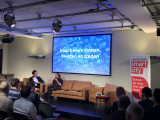
The changes in the field of sustainability are in full swing. Electric cars, heat pumps and solar panels ensure that a lot of people can make their contribution, even at home. At the same time, these innovations appeal to the electricity grid in the city. More infrastructure is needed to be able to supply the increasing demand for electricity. On the other hand, we have to deal with electricity in different ways. How do we do this? What is needed to keep moving forward? And how do we involve residents in this?
On the 15th of October, Amsterdam Smart City and some of our partners discussed this topic in Pakhuis de Zwijger. Amsterdam Smart City aims for a conversation between its partners and the general public. After all, residents are the ones that have to deal with all innovative projects and the ones with great initiatives themselves, so let’s involve them as soon as possible!
This summer, grid operator Liander and the City of Amsterdam launched a report with an alarming message: in 2050 we will need 2,5 times more electricity than we do now. Eric Koldenhof from the Sustainability department of the City of Amsterdam and Paul van Engelen, region lead Amsterdam of Liander told the audience that this is quite a puzzle, with a growing population and shrinking physical space. For Amsterdam this expected increase in electricity demand means we will need 6 to 8 more electrical substations and around 2.500 small containers throughout the city. They showed a map with warning signs: some of the current substations are already reaching their maximum capacity.
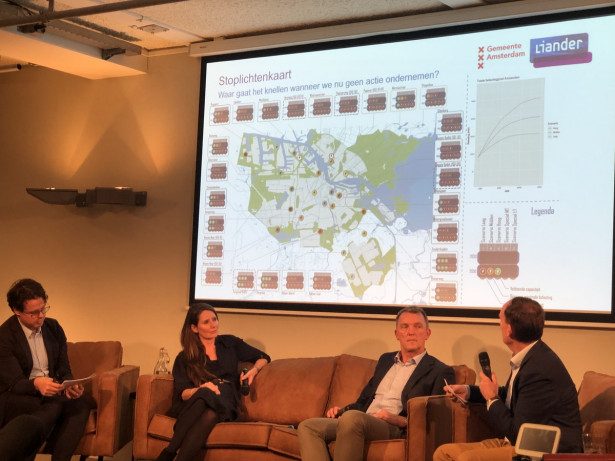
Leonie van den Beuken, program director of Amsterdam Smart City, asked Koldenhof and Van Engelen how critical this issue really is: ‘Is there a possibility we will not be able to switch on a light in the near future?’ Paul: ‘We won’t lose power, don’t worry. The real problems are the new developments. With the current capacity on the grid, it will be very hard to connect new customers, such as big car charging stations or datacenters.’
We will need to expand the electricity grid, but there are two other big recommendations in the research: we need innovative solutions that can work off the grid or efficiently to reduce the impact on the grid and the City and Liander want to look forward and cooperate more. If we have to open up a street for cabling, this can be a possibility to do other constructions simultaneously.
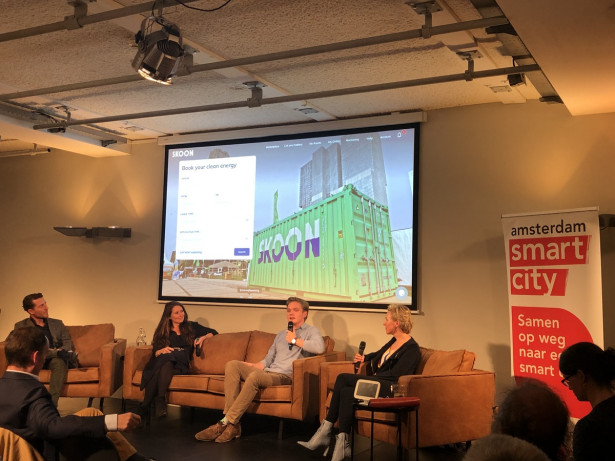
Falco Pieters from Stichting Wiek-II, Peter Paul van Voorst from Skoon Energy and Marjolein Bot from the Amsterdam Economic Board are the ones with solutions to unburden the electricity grid. In Arnhem-Nijmegen, Falco combines technological innovations, wind and solar energy with the participation of citizens. Wiek-II found a way to connect this generated energy to the grid more efficiently and they are happy to copy the concept to other areas in the Netherlands.
Skoon Energy created big switch batteries, mainly for the maritime sector, but they also work for festivals and construction – and perhaps even in the city as a temporarily solution These batteries are short term solutions, but batteries can be charged when there is space on the grid. Peter Paul: ‘I am really happy with the ambitions of the City of Amsterdam and the urgency for innovation. This creates opportunities for my business!’
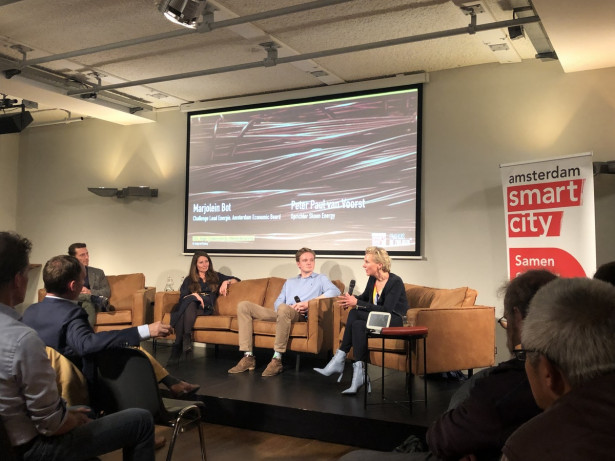
Marjolein Bot told the audience about her research on the influence of digitalization. Not only sustainable solutions ask for more electricity, data and digitalization are increasing the demand as well. Marjolein is working on efficiency in IT such as green coding, photonics, blockchain, AI and datacenters.
In 2021 governments with plans for the public space will be obliged to incorporate citizens’ opinions in their plans (‘Omgevingswet’). This means that participation and co-creation with citizens is becoming more important, also in the decision on where to build new electrical substations in the city. How can we make sure that participation is useful and meaningful? Dave van Loon (Kennisland), Melika Levelt (Amsterdam University of Applied Sciences) and Pauline Westendorp (02025) are working on participation on a day-to-day basis.
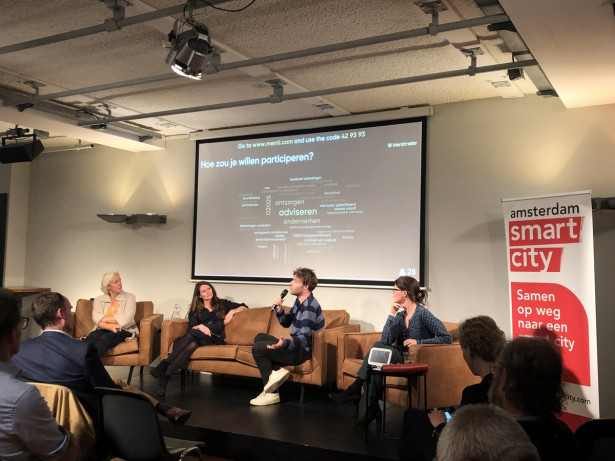
The panel discussed the conditions for citizens to participate in these kind of processes. Melika Levelt: ‘As a government or company, please be clear about the processes that are fixed and that are going to happen anyway. Be clear about the influence residents can have and tell them honestly if you have to make another choice because of political reasons. Citizens will only be interested if you have clear and concrete questions. Take time to hear as many opinions as possible. They really have a feeling about the physical space and their neighbourhood, so take this into account. It is not only a project, but really a place to live.’ Dave: ‘And it is very important to realize that a lot of individuals won’t take the time to cooperate with you. You have to get in touch with citizens’ initiatives and local cooperatives.’
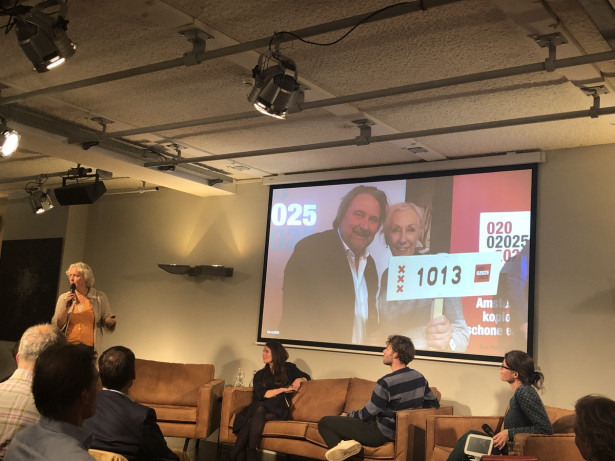
Paulien challenged the City of Amsterdam: ‘Can we focus on developments before 2030 or 2050? Can we make changes now or tomorrow? People are ready for it!’ But be aware: not everyone wants to participate. Some people just want others to take the lead in these developments. And that’s fine as well.
Watch the live feed of the evening here: <https://dezwijger.nl/programma/het-net-onder-spanning>
Want to know more about this? Visit the Kennisland event ‘Out of Office #29: ‘Eerlijke en inclusieve energietransitie: snel en toch samen?’ about the honest and fair energy transition. (in Dutch) Thursday 31 of October in Amsterdam!
Solutions for the nitrogen emissions crisis
The nitrogen emissions crisis has seen as many as 18,000 construction and infrastructure projects stall across the Netherlands, and hundreds of farmers protesting in their tractors. But nitrogen impacts represent one of the greatest threats to our planetary life support systems, with big consequences for biodiversity and climate change.
So, why are nitrogen emissions a problem in the first place? Is the issue primarily related to construction, farming, or something else, and how do we fix this?
Our Industries team lead Pieter van Exter undertook some detailed analysis and outlines potential pathways out of the crisis.
Eerlijke en inclusieve energietransitie: snel en toch samen?
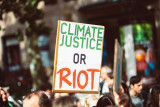
De energietransitie is één van de grote uitdagingen voor de komende decennia. Nederlandse gemeenten maken in de komende jaren wijk voor wijk de overstap naar hernieuwbare energie. Maar: hoe zorgen we ervoor dat iedereen mee kan doen aan deze energietransitie en dat het toch snel genoeg gaat? Hierover gaan we in gesprek tijdens de Out of Office op 31 oktober! We gaan op zoek naar nieuwe inzichten, ontmoetingen en inspiratie, onder het genot van een hapje en drankje.
Spreker: Thijs van Spaandonk. Thijs is stedelijk ontwerper en curator ‘energietransitie als hefboom’ van de Internationale Architectuur Biënnale Rotterdam (IABR) 2020. Hij ziet de energietransitie waar steden voor staan als drijvende kracht achter een inclusieve stadsontwikkeling én andere belangrijke opgaven zoals voedselvoorziening, productiviteit, goed wonen, en sociale gelijkheid. Daarmee is de energietransitie niet alleen een doel maar ook een middel dat bewust kan worden ingezet om te werken aan aantrekkelijke, veerkrachtige en inclusieve steden.
Dit vraagt om een fundamenteel andere, veel bredere en meer integrale benadering en daarmee ook om een andere rolverdeling en samenwerking tussen gemeenten, bewoners, bedrijven en instellingen. Maar hoe ziet dit er dan uit? En welke stappen moeten we zetten om hier te komen? Tijdens deze Out of Office gaat Thijs van Spaandonk in op deze vragen en deelt hij zijn inzichten en ervaringen uit binnen- en buitenland. Vervolgens gaan we gezamenlijk in gesprek om te komen tot oplossingsrichtingen.
Energietransitie slaagt alleen als iedereen mee kan doen
Op naar een meer sociaal-inclusieve energietransitie in en vernieuwing van de wijk!
Looking for a construction company to test our products in Amsterdam
instagrid - we are a start-up with new technology for the world's most advanced battery-driven portable power supply. Our products can replace mobile diesel generators, that are still largely used on construction sites, reducing local emissions to zero and improving the air quality in the city. We would like Amsterdam to be one of the pioneering cities to test and implement this new technology.
Het Net Onder Spanning

De veranderingen op het gebied van duurzaamheid zijn in volle gang. Elektrische auto’s, warmtepompen en zonnepanelen zorgen ervoor dat we steeds dichterbij en zelfs in huis ons steentje bij kunnen dragen. Deze vernieuwingen doen tegelijkertijd een groot beroep op het elektriciteitsnet in de stad. Om de toenemende vraag naar stroom te kunnen blijven leveren, is meer infrastructuur nodig. Maar ook anders omgaan met ons verbruik en keuzes maken zijn noodzakelijk.
Wat zijn de keuzes die we moeten maken over de openbare ruimte en de infrastructuur van ons stroomnet? Op welke manier kunnen we bewoners hierbij betrekken? Wat is nodig om hierin vooruit te blijven gaan? Samen met partners van Amsterdam Smart City zoals overheid, bedrijven en bewoners, gaan wij hierover in gesprek.
Energietransitie
De energietransitie zorgt voor een steeds groter wordende uitdaging: de druk op het elektriciteitsnet. De vraag naar elektriciteit neemt toe naarmate de stad verduurzaamt. Dit zorgt ervoor dat de infrastructuur moet worden uitgebreid, maar ook dat er belangrijke keuzes moeten worden gemaakt. In de schaarser wordende ruimte in de stad lijkt bovendien meer plek te moeten komen voor transformatorhuisjes om in de elektriciteitsbehoefte te blijven voorzien.
Voor de beslissingen over de openbare ruimte worden bewoners steeds vaker betrokken. Zeker nu de Omgevingswet over twee jaar zal worden ingevoerd. Deze nieuwe wet moet ervoor zorgen dat de ruimtelijke ordening integraler, flexibeler, dichter bij de burger en eenvoudiger moet. Hoe moeten we dit in de praktijk vormgeven? Welke manieren van participatie werken hierbij?
Inspiratiesessie bewoners & aardgasvrij wonen

Ben je als gemeenteambtenaar betrokken bij de wijkgerichte aanpak voor aardgasvrije wijken?
Dan nodigen we je graag uit voor onze inspiratiesessie over het voorbereiden van bewoners op aardgasvrij wonen. We praten je bij over de laatste ontwikkelingen in de warmtetransitie. Schuif op donderdagmiddag 7 november 2019 van 14.00 tot 16.30 uur aan in Utrecht! Deelname is gratis.
Datum
Donderdag 7 november
Geschikt voor
Betrokken beleidsmedewerkers of communicatieadviseurs bij de wijkgerichte aanpak voor aardgasvrije wijken
Tijdsduur
Van 14.00 tot 16.30 met aansluitend een borrel
Locatie
Op het kantoor van SME: Kanaalweg 19H in Utrecht
Kosten
Gratis, echter als je je aanmeldt en toch niet komt, vragen we een vergoeding voor de kosten van € 35,-. We hadden dan je plekje namelijk graag aan een ander gegeven.
Uit de sessie neem je concrete kennis over de wijkgerichte aanpak naar een aardgasvrije toekomst mee naar huis. En je krijgt inspirerende voorbeelden van laagdrempelige manieren om bewoners daarop voor te bereiden en te informeren.
Senior adviseur Bregje van den Brand vertelt je vanuit haar eigen ervaringen hoe je als gemeente de juiste stakeholders en bewoners betrekt bij de warmtetransitie. Wie betrek je wanneer? En hoe je als gemeente nu al kunt beginnen om bewoners voor te bereiden op aardgasvrij wonen. Welke rol heeft de gemeente? Wanneer zijn bewoners eigenlijk ‘aardgasvrijklaar’?
Senior adviseur Imke Tegels laat je aan de hand van praktische voorbeelden uit onze wijkaanpak zien hoe wij mensen in beweging brengen om nu al stappen te zetten.
We wisselen (eventuele) eigen ervaringen uit met het betrekken van bewoners bij de energietransitie naar aardgasvrij. Waar sta je in het proces naar aardgasvrije wijken? Ben je al begonnen en loop je tegen dingen aan in communicatie met bewoners? Of is voor jou de vraag ‘hoe begin ik?’ in dit stadium belangrijk? Je krijgt tips waar je mee aan de slag kunt.
Na afloop staat er een borrel klaar en kun je verder praten met collega’s uit andere gemeenten. De sessie vindt plaats op het kantoor van SME: Kanaalweg 19H in Utrecht.
Er is plek voor maximaal 12 deelnemers. Maximaal twee personen per gemeente.
EMPOWER2.0

The project aims to demonstrate and accelerate the empowerment of citizens to become active energy citizens - and to create local energy communities via existing civil society structures - through development of new solutions (e.g. organisational) and adoption of new, emerging and existing solutions for energy ownership.
SMART-CITY: Defined by insiders.
A Smart-City can be defined as the achievement of maximum quality of life with a minimum use of resources, with the help of the intelligent networking of digital technologies. It is possible to make a city more attractive, more environment-friendly and less wasteful of energy or water, facing several challenges at the same time: social, methodological, technical, organizational and conceptual.
Even if this contemporary utopia for our future cities sounds good, it can be useful to bring in mind that Smart-City and democracy were not primarily related. We are collectively running, worldwide, into this model of living but who asked for it? Mainly IT companies whom business models are based on data exploitation, and governments that sighted a good opportunity to bring private investments in public facilities.
When Artificial Intelligence continues to inspire a lot of innovation debates, we already know that an intelligent decision-making algorithm based on data analysis, would probably not make the same choices than humans, influenced be sensitiveness and natural moral law. What we are living actually is an unprecedented opportunity to up-grade the global efficiency of our urban areas, and implicating all stakeholders in its achievement is the crucial condition to avoid a disastrous bouncing effect against technology in a few decades.
The Defeat of two progressive Spanish mayors
In its May 25th edition, the Dutch newspaper 'De Volkskrant' covered the changes that two progressive mayors have induced: In Barcelona, Ada Colou and in Madrid Manuela Carmena. The elections, yesterday June 2nd, have ended their mandates. Although their successors have a radical left background too, their support in both city's councils is minimal. Here and in the national parliament, the socialist party and the center-right parties are the overall winners. Particularly the future of the recently renewed 'smart city-policy' in Barcelona, where Ada Colou and Francesca Bria are 'sisters in arms' is uncertain.
For more detailed information, I enclosed El Pais' English version from today: By the way: the smiling trio are representatives of the right wing Popular Party, not from the socialists as the titel might suggest.
Stay up to date
Get notified about new updates, opportunities or events that match your interests.

